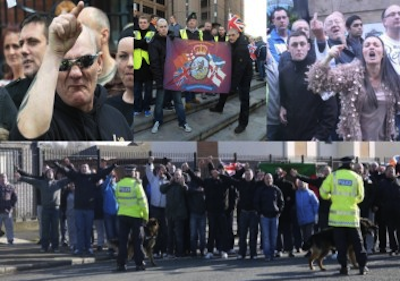
Irish community activists in Britain have sought high-level political discussions following an increase in attacks on Irish events by far-right organisations and loyalists.
On Monday, Cairde na hEireann Liverpool met with that city’s Mayor and senior officials to ask that the rights of the Irish community to hold lawful, dignified and peaceful public events be upheld and protected.
And this week in Wakefield, a small town in west Yorkshire made famous by the hunger strike of Irish martyr Frank Stagg, a dignified republican commemoration was beset a small group of flag-wielding loyalists, with little protection from the Yorkshire police.
Similar problems have been encountered by Irish events and organisations across England and Scotland. But it is Liverpool’s Irish community which has been particularly targeted by right-wing British extremists, through openly racist and intimidatory confrontations.
In a statement, Cairde na hEireann Liverpool said on Monday the attacks had been “an attempt drive the Irish community off the streets of Liverpool.
“They have also been aimed at preventing the expression of Irish culture and our community’s right to commemorate Liverpool-Irish history and honour the memory of such historical figures such as James Larkin and the Liverpool-Irish volunteers who fought fascism in Spain.”
The details of the attacks were published in a recent report by the community group, which has a proud history of involvement in the local anti-racist and anti-fascist struggle.
The report, ‘Under Pressure’, provides an account of recent anti-Irish racism in Liverpool, linking it to a history of institutional racism and far-right and Loyalist activity in the city.
Last July saw a so-called “anti-IRA” march in Liverpool by hardline English Defence League splinter group the North West Infidels (NWI), a far-right street protest movement.
It was planned in response to a march organised by the left-wing James Larkin Society to counter the rise in far-right activity targeting Muslims, trade unionists and Irish republican groups living in the north of England. The event had nothing to do with the IRA.
And this time last year, in scenes unseen since the 80s, hardline British nationalists stopped a march commemorating Liverpool-born Republican Sean Phelan and racially abused marchers. It is feared the same scenes could be repeated in upcoming events.
A number of news publications have also documented the increased links between loyalists and far-right racist groups such as the North West Infidels, Combined Ex-forces, English Defence League and the National Front.
The rhetoric of groups like the English Defence League uses the recycled racism of the 1980s when the National Front and British Movement would stage “anti-IRA” marches as an excuse to attack and intimidate Irish immigrants.
When BBC screened a documentary about Irish rappers, anti-Irish prejudice quickly surfaced on social networks:
“Irish rappers on bbc three!? Give it a rest, f**k off back to the fiddle and flute you potato eating chumps!”
“Irish rappers!!...potato famine has resulted in some damage chromosomes me thinks”
Meanwhile, first and second-generation Irish journalists have also spoken out about what is known in England as “Paddy-bashing” or “Catholic-bashing”.
In blog posts, they have written about an “unspoken rule” that “Irish people are white, so discriminating against them can’t be racist”.
![[Irish Republican News]](https://republican-news.org/graphics/title_gifs/rn.gif)
![[Irish Republican News]](https://republican-news.org/graphics/title_gifs/harp.gif)

